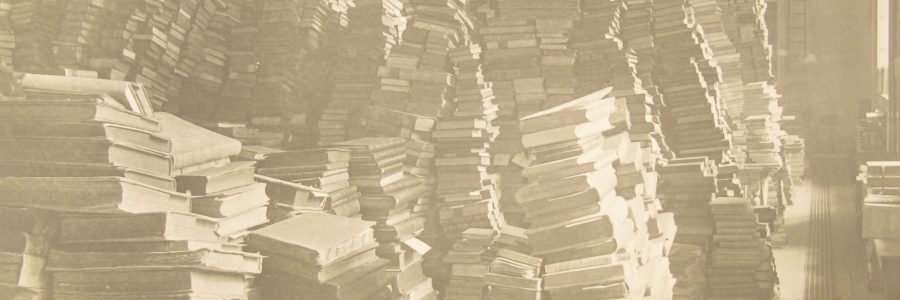
‘With a zeal and skill beyond praise’: the first woman to work at the University Library
The portrait of Anne Jarvis, first female University Librarian 2009-16, was unveiled on the 7th July. Inquiring into the identity of the first female member of staff has revealed, more than 100 years earlier, a pioneer in women’s education and teaching, with a sideline in librarianship.
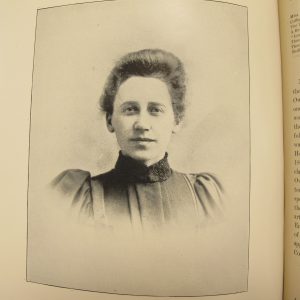
Alice M. Cooke (Owens College Union Magazine New Series No.13, Vol.II, March 1895, classmark L985.c.57.1)
In the period 1903-7, Alice Margaret Cooke (1867-1940) led a team cataloguing the library of historian Lord Acton (1834-1902), given to the University Library at his death by John Morley MP. She came to Cambridge at the recommendation of Adolphus Ward, Master of Peterhouse, from Owens College Manchester (later part of the University of Manchester) via the University of South Wales and Monmouth, Cardiff.
As a student at Owens College, she had been the first woman awarded the prestigious Jones Fellowship in History in 1890 and in 1893 the first to graduate MA and gain employment as a lecturer. She had also cut her teeth in librarianship cataloging Earl Spencer’s Althorp Library, the nucleus of the collection of books and manuscripts for which Mrs Enriqueta Rylands built the Rylands Library in 1899.
Lord Acton was Regius Professor of Modern History at Cambridge from 1895 until 1902. His library contained around 60,000 volumes ranging from the fifteenth to nineteenth centuries, mainly on the ecclesiastical and political history of Europe since the Reformation. The library was partly inherited and partly collected by Acton, with the strong foreign component influenced by his family history. At his death, books lined every room of his homes at Aldenham Park in Shropshire and Tegernsee, Bavaria.
His personal papers, too, were extensive: thousands upon thousands of his working notes, mostly on small slips of paper, arrived by purchase from the second Lord Acton shortly after the Library itself, although the Acton family correspondence, reaching back to the seventeenth century, did not arrive until the 1970s (and was augmented by a further tranche received under the government’s Acceptance in Lieu scheme in 2015).
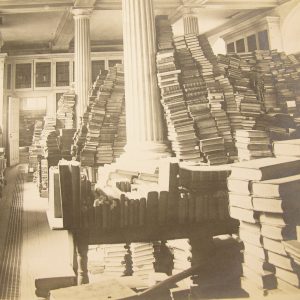
Acton Library books awaiting the attention of Alice Cooke and her team, 1903 (classmark: UA ULIB 12/1/3)
The sheer scale of the task was daunting, but armed with a classification scheme drawn up by Ward and soon assisted by further female colleagues (among them Anabelle R. Hutchinson, late of Newnham College), Cooke steamed ahead. The working space in the University Library, then housed in the Schools buildings in the centre of Cambridge, was cramped. While they waited for shelving to be erected and electricity installed on the ground floor at the west end of Scott’s Building, as the south range of the west court was called, books were piled up on the floor, including that of the neighbouring Arts School, normally used for University lectures and meetings.
Alice Cooke’s periodic reports to the committee overseeing progress, the Acton Sub-Syndicate, tell of duplicates and rejects set aside, pamphlets catalogued, bound and labelled, quantities of incomplete and imperfect sets identified, appeals made for the return of books loaned by Acton to his friends, lists circulated to booksellers of desiderata to fill gaps, and nuanced revision to the overall classification scheme necessitated by growing knowledge of the contents of the library (‘gained’, as she gently put it, ‘during the process of turning over the books and pamphlets’[1]).
The work of cataloguing the Acton library continued up to the First World War, but the lion’s share had been achieved by the time Alice Cooke left in 1907. ‘It is impossible to speak too highly of her work in selecting, arranging and cataloguing the books in that great collection’ said Professor Sorley of the Acton Sub-Syndicate. ‘Her method, her constant and unflurried activity, and her command of every detail, have been remarkable, and have earned the respect of everyone acquainted with this department of the University Library’[2].
Alice Cooke combined librarianship with teaching History at Newnham College for the last two years of her time at the University Library and it was to Newnham she returned as Director of Studies in 1922. Between times, as lecturer and then reader, she had established the Medieval History Department at Leeds University. During World War One she patrolled the streets of Leeds as a policewoman. She retired in 1927 and spent the last years of her life back in Manchester, an invalid, in the care of a community of Catholic nuns.
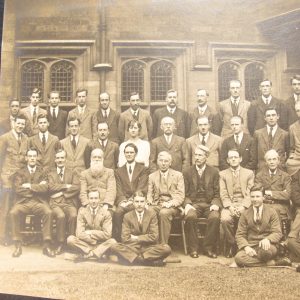
Oldest surviving photograph of Library staff to feature a woman, solitary Miss D. Allen, typist, 1923 (classmark: UA ULIB 12/2/9)
Footnotes
[1] Acton Sub-Syndicate minutes 1903-13, classmark UA ULIB 5/1
[2] Horner and Haworth Alice M. Cooke: a memoir (1940)
Bibliography
I.B. Horner and E.A. Haworth Alice M. Cooke: a memoir (Manchester University Press, 1940) classmark 9450.d.1217
Fernanda Helen Perrone, ‘Cooke, Alice Margaret (1867–1940)’, Oxford Dictionary of National Biography, Oxford University Press, 2004 [http://www.oxforddnb.com/view/article/62414, accessed 13 July 2017]

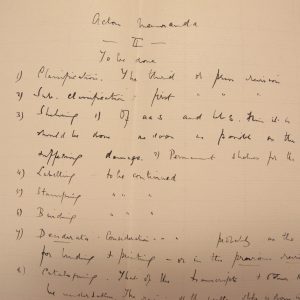
What a fantastic story and an inspirational woman.
Wow! It was such a great acievment. Thank to her now many woman could work at library.
I blog often and I genuinely appreciate your information.
The article has really peaked my interest. I will book mark your blog
and keep checking for new information about once a week. I opted in for your RSS feed too. http://sellmyviolin.com/author/willard2429